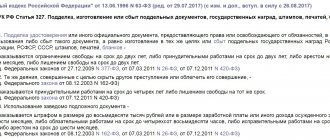ST 176 of the Criminal Code of the Russian Federation.
1. Obtaining by an individual entrepreneur or the head of an organization of a loan or preferential terms of lending by providing a bank or other creditor with knowingly false information about the economic situation or financial condition of the individual entrepreneur or organization, if this act caused large-scale damage, is punishable by a fine of up to two hundred thousand rubles or in the amount of wages or other income of the convicted person for a period of up to eighteen months, or by compulsory work for a term of up to four hundred eighty hours, or by forced labor for a term of up to five years, or by arrest for a term of up to six months, or by imprisonment for a term of up to five years.
2. Illegal receipt of a state targeted loan, as well as its use other than for its intended purpose, if these acts caused major damage to citizens, organizations or the state, is punishable by a fine in the amount of one hundred thousand to three hundred thousand rubles or in the amount of the wages or other income of the convicted person. for a period of one to two years, or by restriction of liberty for a term of one to three years, or by forced labor for a term of up to five years, or by imprisonment for the same term.
Commentary to Art. 176 Criminal Code
1. The subject of the crime provided for in Part 1 of Art. 176 of the Criminal Code, - a loan or preferential lending conditions.
Credit is defined as the lending of money or goods on terms of repayment and, as a rule, with the payment of interest. The Civil Code of the Russian Federation distinguishes various types of credit (bank, commodity, commercial), although there is a point of view according to which commodity and commercial credit are not included in the subject of the crime in question.
2. Deliberately false information about the economic situation includes: incorrect information about founders, managers, business partners; fictitious letters of guarantee, guarantees; falsified contracts, feasibility study for obtaining a loan; warehouse and accounting data, etc.
Deliberately false information about the financial condition includes: information about the balance sheet of the enterprise, an auditor’s report on checking the annual balance sheet, a list of creditors and debtors, etc.
3. Major damage is an amount exceeding 1.5 million rubles, which consists of actual direct damage and lost profits (damage is primarily associated with non-repayment of funds issued to the borrower under a loan agreement, non-payment of interest or untimely repayment of the loan, etc. .d.).
4. In terms of the method of commission, the crime in question is similar to fraud. They are differentiated by the subjective side: in case of fraud, already at the moment of applying to the bank with forged documents, the person has the goal of not repaying the loan received; when obtaining a loan illegally, there is no such purpose.
5. According to Part 2 of Art. 176 of the Criminal Code, the subject of the crime is a state targeted loan. It can be provided to a legal entity on the basis of an agreement concluded taking into account the specifics established by the Budget Code of the Russian Federation and other regulatory legal acts, on the terms and within the limits of budgetary allocations that are provided for by the relevant laws (decisions) on the budget.
6. It will be illegal to receive a state targeted loan (budget loan) when the rules defining the grounds for receiving a loan are violated. They may consist of: providing deliberately false information about the economic or financial situation, violating the procedure for obtaining a loan (outside of competition), bribing an official on whom the decision on the issue of granting a loan depends.
7. The use of a state targeted loan for other purposes means that the loan was received legally, but the funds were spent for purposes other than those specified in the agreement.
8. The main difference between the crime in question and the act provided for in Art. 285.1 of the Criminal Code is that the budget funds referred to in Art. 285.1 of the Criminal Code are not a loan and are not provided on the terms of their repayment.
Second commentary to Art. 176 of the Criminal Code of the Russian Federation
1. The subjects under Part 1 are: credit and preferential lending conditions (except for loans provided to individual citizens, for example, for individual housing construction). Preferential lending conditions are more favorable, compared to general conditions, for obtaining a loan or repaying it (advantages in the interest rate for the loan or deferment of the start of loan repayment).
2. The objective side consists of obtaining a loan or preferential lending conditions by providing a bank or other creditor with knowingly false information about the economic situation or financial condition of an individual entrepreneur or organization.
3. A mandatory feature of the composition is a consequence in the form of major damage.
4. Subjective side - direct or indirect intent. If a person receives a loan by deceiving the creditor about his economic situation or financial condition, without intending to return it, but, on the contrary, intending to appropriate it, his actions are qualified under Art. 1591 of the Criminal Code, as fraud in the field of lending.
5. Subject is an individual entrepreneur, head of an organization.
6. The subject under Part 2 of Art. 176 of the Criminal Code stands for state targeted loan. This type of loan differs from others in that it simultaneously has two characteristics: 1) it is issued by the state and 2) it has a strictly intended purpose - for example, to replenish working capital.
7. The objective side is the illegal receipt of a targeted loan or its use for other than its intended purpose, which resulted in causing major damage to citizens, organizations or the state. Receiving a loan is illegal if a person did not have the right to receive it or violated the established procedure for obtaining such a loan.
8. The crime is over when major damage has been caused.
9. The subjective side is characterized by direct intent.
10. Subject - an individual entrepreneur, head of an organization and a private person.
Commentary on Article 176 of the Criminal Code of the Russian Federation
1. The normative material for the article consists of: Civil Code; regulatory documents that were specified in Art. 172 CC; Regulations on the procedure for the Bank of Russia to provide loans to banks secured by collateral and guarantees (as amended on December 28, 2001), approved. Central Bank of October 3, 2000 N 122-P <1> and others ——————————— <1> Bulletin of the Bank of Russia. 2000. N 54; 2001. N 20 - 21; 2002. N 2.
2. The commented article in its two parts provides for independent compositions, united by the general concept of “credit”. It is a monetary or other material loan provided by a lender to a borrower.
The commented article applies to all types of loans. It is no coincidence that the legislator in Part 1 of the article, pointing to the creditor, speaks of a bank or other creditor, without limiting the latter to a credit organization.
3. The subjects of the encroachment provided for in Part 1 of the comment. Articles include credit and preferential lending conditions.
4. There are a great many types of loans, and almost all of them can be the subject of the crime being analyzed. Only those loans that are provided to individual citizens cannot act as items under Part 1 of the article - consumer loans, for example, a loan for individual housing construction.
5. Preferential lending conditions are more favorable, compared to general, conditions for obtaining a loan or repaying it. The borrower is provided with advantages in the interest rate for the loan or a delay in the start of loan repayment.
6. The objective side of illegally obtaining a loan (Part 1) is in obtaining a loan or preferential lending conditions in the manner specified in the law: by submitting knowingly false information to a bank or other creditor about the economic situation or financial condition of an individual entrepreneur or organization. The consequence in terms of composition is the infliction of major damage by the act.
7. By receiving a loan we mean its issuance (at least in part) by the lender to the borrower. The loan can be issued in cash (bank loans to legal entities are not issued in cash); the loan amount can be credited to the current or correspondent account/sub-account of the borrower enterprise; it can be sent by the bank from these accounts on behalf of the borrower directly to pay for settlement documents presented to the account, etc. The same concept applies to obtaining preferential lending conditions.
8. Only one way of obtaining a loan is criminally punishable - providing the lender with false information of a certain content. The information may relate to the business or financial condition of the borrower; the information is defective; it is not true. Deliberately false information, as a rule, is contained in documents of an individual entrepreneur or borrowing organization submitted to a bank or other lender: in a feasibility study of a loan, copies or originals of agreements and contracts confirming it, balance sheets of an enterprise, a certificate of the presence or absence of loans for other banks and creditors, documents on state registration and licensing of business activities.
9. The information concerns only those who wish to receive a loan - an individual entrepreneur or an organization of any form of ownership or nature (commercial or non-commercial). Submission of false information relating to the economic status or financial condition of the guarantor or guarantor does not fall under the method of obtaining a loan under Part 1 of the comment. articles.
10. Documents on the right to receive a preferential loan may also contain deliberately false information about the economic situation or financial condition of the borrower. The lender can also be deceived in documents related to collateral (in secured loans), in insurance documents for credit transactions, etc.
11. Forgery of documents should entail an independent criminal offense under Art. 292 or 327.
12. The crime in the analyzed form is over when major damage is caused. The concept of major damage is defined in the note. to Art. 169; it must exceed 250 thousand rubles. Damage can be caused, in addition to the creditor, to the guarantor, the state, other business entities, etc.
13. The subjective side of illegally obtaining a loan (Part 1) is characterized by direct or indirect intent.
14. The composition excludes the purpose of non-repayment of the loan that arose before its receipt. If a person receives a loan by deceiving the creditor about his economic situation or financial condition, without intending to return it, but, on the contrary, intending to appropriate it, his actions are qualified under Art. 159 as fraud.
15. The subject of the criminal offense provided for in Part 1 of the comment. articles - an individual entrepreneur or the head of an organization.
16. The subject of the encroachment (Part 2 of the commentary article) is a state targeted loan.
This type of loan differs from others in that it simultaneously has two characteristics: 1) it is issued by the state and 2) it has a strictly defined purpose, intended, for example, to replenish working capital.
17. The objective side (Part 2) is the illegal receipt of a targeted loan or its use for other than its intended purpose, which resulted in causing major damage to citizens, organizations or the state.
18. Obtaining a loan must be illegal, i.e. the person did not have the right to receive it or violated the established procedure for receiving such a loan.
19. Obtaining a targeted loan by submitting knowingly false information about the economic situation or financial condition to the state creditor (CBR) is covered by the scope of Part 2 of the comment. articles.
20. The use of a state targeted loan for purposes other than its intended purpose occurs when the borrower uses loan amounts for needs not specified in the loan agreement. For example, money issued for housing construction is used by the borrower to expand production, pay wages, repay loans, pay taxes, are placed in deposit accounts in commercial banks, transferred to the authorized capital, etc.
21. If part of the funds from a state targeted loan is appropriated by the perpetrators, the act must be qualified as theft.
22. The crime (part 2) is over when major damage is caused. The concept of major damage is defined in the note. to Art. 169; it must exceed 250 thousand rubles.
23. The subjective side is characterized by direct and indirect intent.
According to its composition, the purpose of appropriating a targeted state loan is impossible if it arose before its receipt. It provides grounds for the application of Art. 159.
24. Subject of a criminal attack according to part 2 comments. The article is broader than in Part 1. It can also be a private person who illegally received a state targeted loan or used it for other than its intended purpose, causing major damage to legally protected interests.
25. The acts reflected in parts 1 and 2 belong to the category of crimes of medium gravity.






